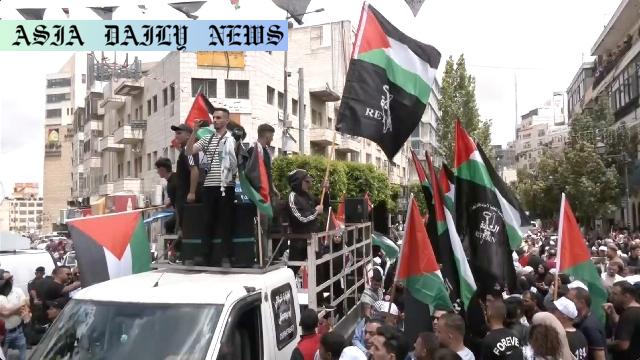Ceasefire talks gain traction amidst deadly Gaza conflict
Palestinians in the West Bank called for a ceasefire in Gaza during Nakba’s 77th anniversary.
Health authorities in Gaza reported over 52,928 deaths since October 2023.
Ceasefire talks are reportedly underway in Qatar despite continued violence.

Palestinians Urge Immediate Ceasefire: The Context
The 77th anniversary of the Nakba holds deep historical and emotional significance for Palestinians. The term “Nakba,” meaning “catastrophe” in Arabic, commemorates the mass displacement of Palestinians in 1948 following the establishment of the state of Israel. This year’s commemoration, however, took place under the shadow of escalating violence in the Gaza Strip. Thousands of Palestinians gathered in Ramallah, a key city in the West Bank, to voice their urgent demand for an immediate ceasefire in Gaza.
Recent escalations have seen countless lives lost and widespread devastation in Gaza, further exacerbating an already dire humanitarian crisis. The gathering in Ramallah sought not only to honor Nakba but also to amplify demands that the international community take swift action to end the conflict.
Calls for Ceasefire Amid Mounting Casualties
Participants in the protest highlighted the critical need for an end to hostilities. A sentiment echoed repeatedly by those present was the need to “stop the aggression against Gaza.” Many pointed out Israel’s continued occupation and daily violence, citing it as a core cause of ongoing instability. Protesters, including women and children, called for an end to the military campaign and an immediate withdrawal from Gaza.
The human cost of the conflict has been staggering. Gaza’s health authorities reported that over 52,928 individuals had died since October 2023 amidst Israel’s intensified military actions against Hamas. Within 24 hours leading to the protest, 20 new fatalities were reported, symbolizing the unrelenting nature of the violence.
Political Challenges: The Roadblocks to Peace
While ceasefire talks have resumed in Qatar, the political landscape remains highly polarized. Israeli Prime Minister Benjamin Netanyahu has publicly stated that military operations against Hamas will continue, indicating a lack of immediate resolution. This stance directly counters calls for halting aggression and sets a challenging stage for negotiation efforts.
On the Palestinian side, the growing dissatisfaction with prolonged negotiations has also sparked calls for more decisive actions. Protesters stressed that repeated diplomatic talks have failed to bring tangible progress, emphasizing that urgent measures are necessary to prioritize civilian lives and halt the escalating crisis.
The Role of the International Community
The international community’s role in mediating and fostering peace is pivotal. Countries like Qatar have stepped in to host discussions aimed at achieving a ceasefire, but the global response remains deeply divided. Palestinians at the protest urged global leaders to hold Israel accountable for the ongoing violence and to press for measures that prioritize humanitarian needs over geopolitical strategies.
Human rights organizations have also been vocal in condemning the violence, calling for immediate interventions to provide aid and relief to affected civilians in Gaza. Relief organizations warn that continued inaction may lead to a humanitarian catastrophe.
Conclusion: Urgent Need for Action
The tragedy unfolding in Gaza highlights the pressing need for a comprehensive approach to end the conflict. The 77th anniversary of the Nakba served as a stark reminder of the unresolved struggles faced by Palestinians, further underscored by the growing death toll and widespread devastation in the region. As ceasefire talks continue amidst ongoing violence, the need for urgent, decisive, and lasting solutions cannot be overstated.
It is imperative for all stakeholders, including the international community, to intensify efforts to mediate a ceasefire and create conditions conducive to long-term peace and stability. Without immediate action, the human toll of the conflict will continue to rise, perpetuating cycles of violence and suffering.



Commentary
The Importance of a Ceasefire in Gaza
The ongoing conflict in Gaza has once again brought the region’s complex dynamics to the forefront. As health authorities report the loss of over 52,000 lives in just a few months, the human tragedy underscores the urgent need for a ceasefire. Each passing day adds to the devastating toll on families, communities, and the infrastructure needed for survival. A ceasefire is not merely a pause in violence; it is a humanitarian necessity.
Reflecting on the Significance of Nakba
The 77th anniversary of Nakba is a somber reminder of the historical injustices and suffering endured by Palestinians since 1948. The mass displacement born out of that event continues to shape the narrative of an entire generation, fueling a quest for justice, recognition, and peace. Commemorating the Nakba during an active conflict intensifies its significance, as it draws attention to the enduring challenges faced by displaced and oppressed populations worldwide.
The Role of Global Leadership in Conflict Resolution
In times of crisis, global leadership and international solidarity play crucial roles. The ongoing ceasefire talks in Qatar, while a step in the right direction, must culminate in actionable outcomes. Diplomatic efforts must transcend political divisions and prioritize humanitarian concerns. Nations with significant influence must push for accountability, demand cessation of hostilities, and ensure the delivery of aid to affected regions like Gaza.
The scale of human suffering in Gaza is a test of our collective conscience. As the world watches, the urgency of peace becomes all the more evident. Global citizens, organizations, and governments must rally behind efforts to prioritize human lives and facilitate dialogue that leads to sustainable peace.